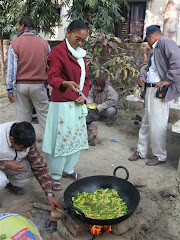February 7. From Biratnagar to Delhi in a few hours. We sped through clean, green New Delhi – majestic tree lined avenues, new (but frequently dented) private cars (Tata of course), gas powered autorickshaws, buses and even rubbish disposal carts. Our friendly hotel in Karol Bagh was surrounded by the usual jumble of street vendors, garish colours, vibrant advertising hoardings, tea shops, beggars, stray dogs and piles of debris. We spent the next day in the sophisticated Khan Market, buying books (what choices! 3 international bookshops, including the one William Dalrymple claims as his favourite) a few clothes at the irresistible Fabindia, and eating delicious food. Part of the ‘old India’ survives and I was able to get a haircut and head massage for less than £1.
South to Kerala, where we stayed in the small guest house on the cliff top in Varkala that we discovered when it first opened 5 years ago. Ten wonderfully relaxing days of beach, sun, big seas, new books and quiet evenings eating dinner under the stars, listening to the waves pounding against the cliff. We made occasional trips to town to buy fruit, passing flatbed lorries carrying elephants between temple festivals, and enjoyed an evening at the local temple with a colourful parade, marvellous drummers and a procession of highly decorated elephants. On the way back to Kathmandu we spent a night in the relatively posh Jorbagh colony in South Delhi, although we were reminded that it was Indian by the ‘do not spit in the flowerbeds’ signs, and ‘do not use the towels to clean your shoes’ notice on the back of the door to our room. We strolled thorough the beautiful Lodhi Gardens, full of mynah birds and green parakeets flitting between the magnificent 15th century Moghal tombs, to replenish our books and our stock cupboard. At the airport the next day attempts were made to confiscate my supplies of pesto and tahini, bought at great expense in the Delhi deli. Eventually they compromised by opening all the jars and digging around with a pair of scissors for WMDs. They didn’t find any.
Back to a Kathmandu almost at a standstill. Two week bandh in the Terai had prevented any petrol, diesel, kerosene or gas reaching the capital. Huge hopeful queues at fuel stations which remained closed, food supplies reduced, restaurants shut, friends running out of fuel for cooking and heating. We managed to escape for the weekend to the beautiful Newari hill town of Bandipur, where the paved streets have only human traffic and many of the buildings have been lovingly restored.
Our VSO Education review workshop was a safari and logistical nightmare. We started as volunteers only with breakfast in a hotel in Kathmandu. After a morning of heated discussion, we managed to reshape the subsequent days into a more coherent programme. At the end of the day we were bussed from Kathmandu to Dhulikel, 25km into the mountains, picking up our chilly Nepali partners at various points along the way. The journey – normally 1½ hours, took more than 4, with frequent jams and blockades near petrol stations. There was the compensation of dinner waiting, comfortable beds with huge fluffy duvets and hot waterbottles when we eventually arrived. After a good day working with our partners (Durga and Tulsi from the ETC, and Babaram from the DEO office, who appears keen and committed to support David’s project), we had an early night before setting off at the crack of dawn for our next destination, where we joined the HIV and Governance volunteers in Godavari for a day of ‘sharing’. A long journey through Friday night traffic back to the city, where David joined a group of VSO fundraisers about to start a trek to Everest base camp at the Summit Hotel in Patan.
At last, clearance to go home, and after a frustrating 5 hours at the airport on Monday while the backlog of Sunday’s flights cancelled by torrential rain were cleared, we arrived in hot, humid and thundery Biratnagar. We were delighted to open up our dusty flat, cycle to the market where we were warmly greeted by our usual suppliers, especially as they have been suffering by almost 3 weeks of closure, and load up our baskets. At home, the women were quickly into the compound to cut the grass for their animals, while the children were blowing kisses and shouting their newly acquired English phrases. Having unpacked, we received a phone call from the VSO office, informing us of more Madhesi bandhs starting tomorrow……
Deb and David will try to update this blog regularly while they are in Nepal. The views that are expressed in this weblog are the writers' own and do not necessarily reflect those of VSO.
ETC Morang
Biratnagar weather
About Me
- Deb and David
- Deb and David are leaving the UK for Papua New Guinea on February 4 2011 for their 3rd VSO placement. The views that are expressed in this weblog are the writers' own and do not necessarily reflect those of VSO.
Hungry caterpillar
making statues
.jpg)
Saraswati puja
.jpg)
Christmas dahlia

Christmas

recovery

cataract operations

diagnosis

English group

English teachers

Chhath
.jpg)
Manu
.jpg)
Rosie
.jpg)
fireworks

tikka powder

making resources

Down.....

Marpha apples

Kali Ghandaki

Buddhist monks

Kagbeni monastery

Tulsi

Lalmani

grinding maize

teachers' outing

towards Darjeeling

Ilam


kindergarten visit

David and the puppets
.jpg)
David's pocket chart

next door cows

chess in Bandipur
Bandipur
Kerala temple festival
Puja, age 10

headteacher tries to break the pot
catch the biscuit
Bishnu peels vegetables
group photo
cooking

Maliti

Christmas transport
Bardia Christmas
building the straw stack
rice threshing
Tihar
Janakpur temple
Dashain swing
Poon Hill
Annapurna South
baby Krishna
chariot

decorated oxen
Krishna Janmastami
Terai floods
the cow next door
new raincoat
More plants

At home

Dinesh

science teachers

Main Road

David on the terrace

primary teachers


Headteachers' picnic

sturdy bike

Nagarkot morning

Swayambhunath temple

view from window

'home'
arrival in Kathmandu
